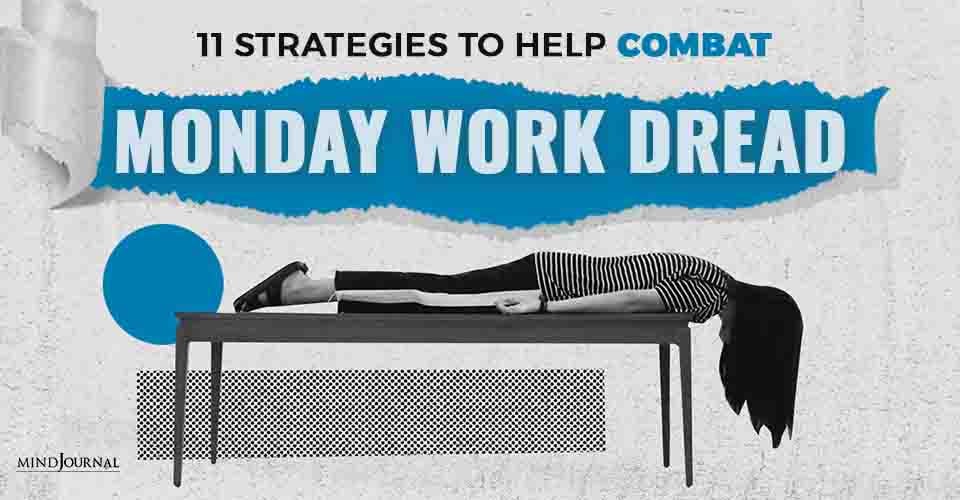How do I stop my Monday work dread? The phrase “Sunday scaries” was introduced in the Urban Dictionary in 2009. The stress around deadlines, frustrating bosses, or a long commute strikes strongly for many of us. So how do you treat the brand of anxiety that crops up on Sunday nights?

11 Strategies When You Dread Going To Work
Try out these tips to ward off Monday dread.
1. Delete Your Outlook App On Weekends
Weekends should be a true pause on all things work-related. But mobile phones have made it difficult as our work follows us, dinging someone’s emails anytime.
These tiny interruptions can cause big waves of anxiety. Consider deleting your mail app from your phone as soon as Friday at 5 p.m. hits. This will also serve as an exhale type of moment, signifying it’s time to unplug after a week of hard work.
Related: 4 Toxic Habits That Cause Energy Leaks In Your Life
2. Work For 1 Hour On Sunday
Conversely, sometimes you need to plug in on the weekends to avoid anxiety. I’ve found that some of my career coaching clients benefit from connecting to work for one hour.
This time should be focused, though. Use your weekend work hour to get set for the week ahead. Stay in an offensive state of mind instead of going into defense mode by replying to emails.
3. Plan Your Week
As mentioned, creating a proactive plan for your week can generate a sense of control and calm. Consider writing your plan down. Putting pen to paper helps you to slow down and think about what you want to accomplish.

4. Find Something During The Work Week To Get Excited About
Write a list of things that make you happy, like listening to your favorite podcast on your commute or having sushi at your favorite spot on your lunch break.
Plan time for these things as if they were work meetings. Schedule them, so they happen (and work doesn’t derail you). There’s something healthy and necessary about taking time for yourself.
Related: 14 Proven Ways To Stop Working Around The Clock
5. Take An Office Breather
I understand some people don’t have the privilege of flexibility to take a lunch break or even listen to a podcast during work.
A great office escape is to focus on your breathing. Just a few minutes of concentrated breathing can stabilize heart rates and calm your nerves.
6. Plan Low-Key Sunday Activities
Sunday Funday can seem like a good idea to ward off anxiety. But adding alcohol into the mix on Sunday might be something to put on hold, especially if you’re experiencing anxiety and depression. Monday dread is made even worse by a hangover, dehydration, and fatigue.
7. Don’t Beat Yourself Up About It

Job anxiety can be expected. Feel whatever you need to, and don’t beat yourself up.
A genuine concern is an impact on health, mental wellness, and a general sense of happiness when you spend too much time dreading work.
8. Connect To A Higher Goal
Find an inner motivation that sparks an urge to get out of bed every morning.
Are you doing it so that you can earn money to travel? Maybe you’re making money so you can save enough to pay off a student loan (which will then enable more financial freedom).
When you can establish a higher goal and link the value of your job to that personal goal, going through the motions of a job you dread makes it less dreadful.
Related: The Hidden Secret To Achieving Your Goals
9. Identify And Focus On Positives
Even in bad jobs, there’s usually something to be thankful for. What about a co-worker you can relate to? Do you have valuable experience in this industry?
No, I’m not advocating for toxic positivity here. The truth is, positivity helps you feel better. The more you can train your brain to look at the upside, the better you’ll feel in body and mind.
10. Connect With Colleagues
Talk to colleagues at your company to see if those same stressors are present for them. Often simply knowing you aren’t alone is helpful.
If you notice a theme across your department, you can help influence change by speaking with your boss with the support of your colleagues.
Your manager probably has no idea you have a negative experience.
11. Check Your Mental Health

Mental health can be a big reason people dread work. If you notice actual physical manifestations of anxiety at work like stomach pain, shaking, or difficulty breathing, it’s time to check in with a mental health professional.
The main concern is whether you have an anxiety disorder. Anxiety and depression are highly treatable. There’s no reason to keep moving forward without help. Rely on mental health support.
Related: 13 Characteristics Of A Mentally Healthy Person
12. Consider A Job Search
If you still dread going to work after trying all of these tips, it might be time to consider a new job search and a new company.
Work dread isn’t just a personal issue. Your feelings could very well be impacting your family. It could be causing stress on your partner. Dreading going to work every Monday morning shouldn’t be a forever part of life.
Please share this article with anyone who you may think will find it valuable and helpful
Written by: Brynn Johnson Originally appeared on:Psychology Today Republished with permission










Leave a Reply